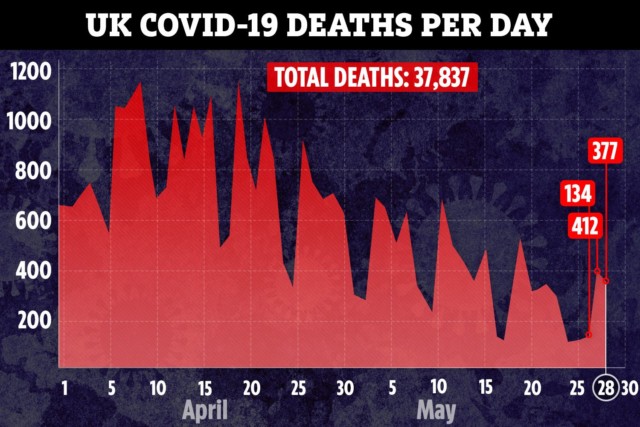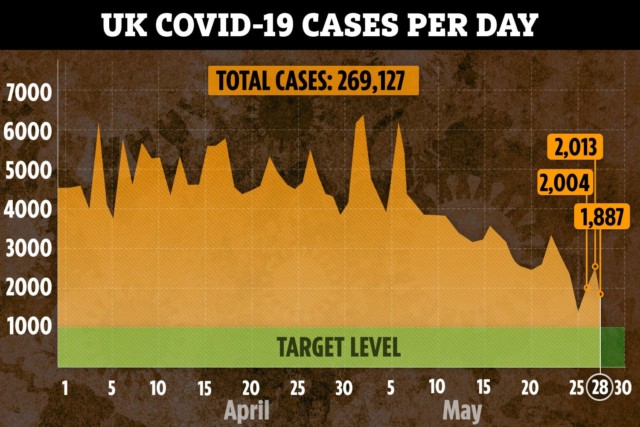EMPLOYERS will have to start paying some of the costs of furloughed workers from August under changes announced to the Government’s wage support scheme tonight.
Chancellor Rishi Sunak announced that from August 1 they will be required to start paying National Insurance and pension contributions for furloughed staff.
From September, businesses who continue to furlough employees will have to stump up 10 per cent of their wages and 20 per cent in October.
The Government will continue paying the remainder of the wages to ensure all furloughed workers receive 80 per cent of their salaries – up to a maximum of £2,500 per month – until the end of October.
But Mr Sunak revealed that furloughed workers will be allowed to return part-time from July in a bid to give businesses maximum flexibility as they begin to resume operations and adjust to the new Covid-19 workplace arrangements.
This is a month earlier than previously planned.
Officials added that companies can be flexible with their definition of “part-time” as long as a full-time employee has not returned to normal hours. Employers will be required to submit data on the usual hours an employee would be expected to work in a claim period and actual hours worked.
The Treasury said: “Individual firms will decide the hours and shift patterns their employees will work on their return, so that they can decide on the best approach for them – and will be responsible for paying their wages while in work.”
The chunk of money employers will have to start contributing is smaller and is being introduced later than expected.
It is understood this is designed to limit the number of job losses triggered by the changes amid evidence many firms won’t be able to afford to contribute anything towards the cost of furloughed workers.
A survey by the Institute of Directors earlier this week found a quarter of firms will struggle to afford to pay anything towards furloughed staff and will be forced to make redundancies when the changes come in from August.
The Treasury has insisted the new arrangements mean that the total cost of employer contributions would represent around 5 per cent of the gross employment costs that they would have incurred had the employee not been furloughed.
Announcing the changes tonight, Mr Sunak said: “Our top priority has always been to support people, protect jobs and businesses through this crisis. The furlough and self-employment schemes have been a lifeline for millions of people and businesses.
“We stood behind Britain’s businesses and workers as we came into this crisis and we stand behind them as we come through the other side.
“Now, as we begin to re-open our country and kickstart our economy, these schemes will adjust to ensure those who are able to work can do so, while remaining amongst the most generous in the world.”
Firms will not be able to furlough new staff beyond June 30 so the changes will only affect those who have already been put on the scheme.
This means firms have until June 10 to furlough new staff because of the three-week minimum period they must currently be out of work for.
Employers wishing to furlough staff part-time must report
The scheme operates UK-wide, with no differences across the four home nations.
The Government will cover 70 per cent of wages up to £2,190 in September, with employers to pay National Insurance and pension contributions and 10 per cent of wages, representing 14 per cent of the gross employment costs.


The following month, the Treasury will pick up 60 per cent of wages up to a cap of £1,875, with employers paying tax contributions and 20 per cent of wages, representing 23 per cent of the gross employment costs, the Government said.
It added that only 40 per cent of businesses had claimed the pension contributions since the scheme was launched.
Since it was launched, the Coronavirus Job Retention Scheme has been used by one million businesses to support 8.5 million jobs, at a cost of £15 billion so far.
The scheme is expected to cost a total of around £80 billion, or £10 billion a month, although the Office for Budget Responsibility is set to publish detailed costs next week.
Business groups had asked the Government to ensure that those industries suffering hardest were most protected.
But the Treasury said it was not always clear which sector a business was in, insisting it would not rule out future support if required.
Did you miss our previous article…
https://www.hellofaread.com/politics/local-lockdowns-could-lead-to-significant-risk-of-disorder-sage-documents-reveal/









